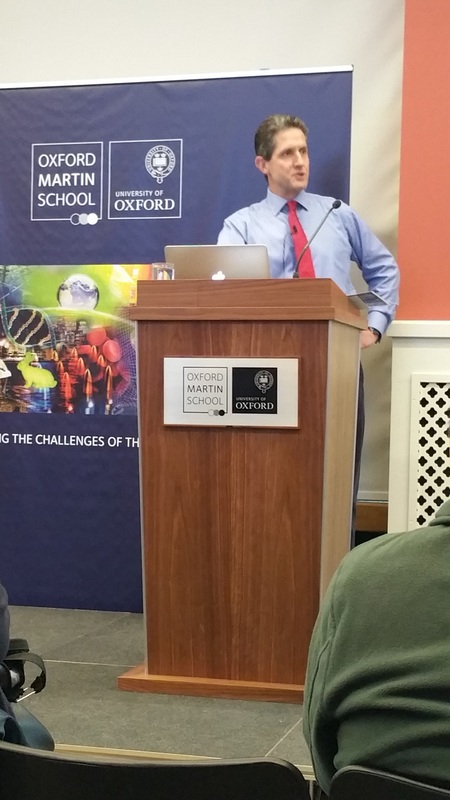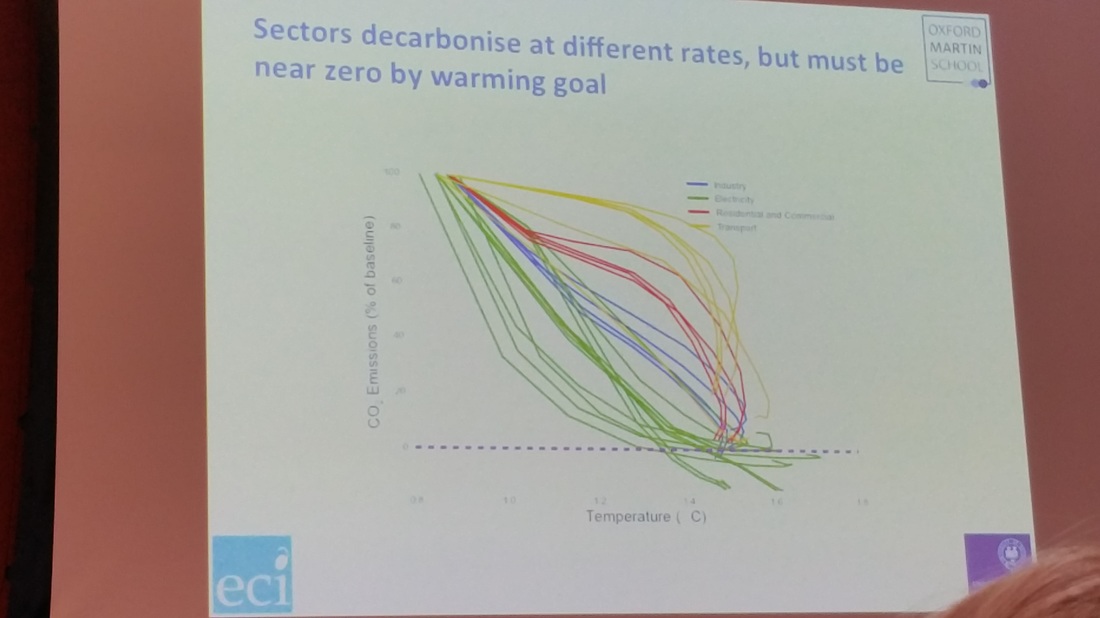|
http://www.oxfordmartin.ox.ac.uk/event/2308
Professor Allen set out the global context: rising cumulative atmospheric carbon - COP21 in Paris – Article 4 expressing the direction of travel towards zero net carbon. http://safecarbon.org/ He posed various questions about the opportunities, responsibilities and part played by businesses in the transition to net zero carbon. His talk, and responses to questions, contained optimism that companies might self-regulate – to deliberately plan for their businesses to flourish in, and contribute towards, keeping the peak global temperature increase to less than a specific number of degrees centigrade. I’m also optimistic – that a global governance organisation might emerge that has teeth and is able to (if necessary) set carbon budgets globally, by region and even by country, just in case self-regulation doesn’t work. If we can imaging it, it can happen. I’m optimistic that we will get to net zero carbon as part of the transition to a sustainable and fair future. It might be messy along the way, and my focus is on minimising the damage and disruption during the transition. I hope many people in the audience today are of a similar view. Their questions seemed to suggest they were. The chart below shows the likely trajectories of several business sectors towards a net zero carbon future, with electricity being the leader and transportation the laggard.
0 Comments
Recently, people have responded positively to the IEA’s news that there are a number of countries where there appears to have been some degree of decoupling of carbon emissions from economic growth. For example, Carbon Brief have commented about it here:
http://www.carbonbrief.org/the-35-countries-cutting-the-link-between-economic-growth-and-emissions This got the Planetary CFO thinking about how this relates to finite/closed system aspects of our planetary home. Decoupling is a good thing, but not sufficient of itself to prevent us making our home uninhabitable by a civil and multitudinous human population. What really matters is whether the cumulative atmospheric carbon can be kept within an absolute limit to prevent runaway climate change switching the Earth into a new and much less survivable equilibrium state. Hence we need a cumulative carbon budget, and hence human-generated carbon emissions need to be close to zero within the next couple of generations. There is also the matter of “leakage” – where some countries might be reducing their emissions, but importing more goods from elsewhere with high embedded carbon emissions, which means that they are effectively exporting their carbon emitting behaviours to the countries they import those goods from. A graph, for a particular country, showing its economy growing and its carbon emissions falling might be a little comforting, 35 countries even more so, but it is far from showing that the battle for sustainability is being won. here to edit. Planetary problems such as Climate Change and Global Inequalities need planetary solutions. While nation states remain fractured and isolationist, these solutions at a global level become more difficult to achieve. By contrast, as countries find ways to work together, such as with the EU-wide agreements and targets on carbon emissions (20% reductions by 2020), we move closer to global level measures to tackle these complex problems. The same would be true for financial measures such as a World Balance Sheet. With a strong European leadership in this topic, we would be far more likely to find ways to create a standard for multi-national accounting for things like Natural Capital than if each nation of the EU developed and operated an approach independently of the others. A European standard would take us a step closer to a global standard and the creation of a World Balance Sheet written in a financial language that all countries can understand.
This is not an argument for every aspect of governance to be globalised, but only for those aspects of human activity that require a global approach in order to succeed. Governance of human activities that contribute to Climate Change is one such aspect. That’s why the Planetary CFO will be voting for the UK to stay in the EU. |
AuthorThe Planetary CFO - working towards a sustainable World Balance Sheet. Categories
All
Archives
July 2024
|


